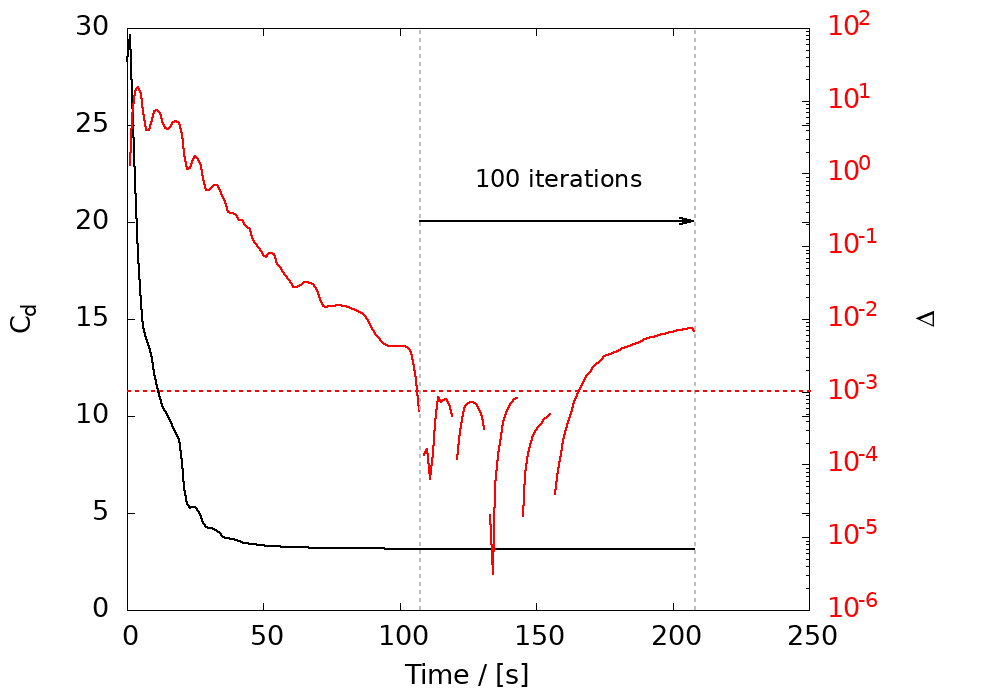The runTimeControl function object provides a mechanism to manipulate cases
based on a set of run-time conditions. On satisfying the condition(s) users
can instruct the case to:
- terminate and write calculation data to disk, or
- start additional function objects by setting triggers
The set of run-time conditions comprise:
-
average: average value converges to within limits; -
equationInitialResidual: equation initial residual exceeds a value; -
equationMaxIter: equation number of iterations exceeds a value; -
maxDuration: maximum duration; -
minMax: minimum/maximum exceeds limits; -
minTimeStep: minimum time step exceeds a value; -
none: no-op.
By default, cases will terminate if any condition is satisfied using an OR condition. Optionally, conditions can be grouped whereby the case will only be terminated if all group member conditions are satisfied using an AND condition.
The optional nWriteStep entry can be used to write all field
data each time the conditions are satisfied for a specified number of steps
prior to termination.
Usage🔗
The function object is specified using:
runTimeControl1
{
type runTimeControl;
libs ("libutilityFunctionObjects.so");
conditions
{
<list of conditions>
}
}
The following example will terminate the calculation if:
- the momentum initial residual exceeds 0.9 (used as a divergence indicator),
OR - the number of the momentum solver iterations exceeds 100 (used as a divergence
indicator),
OR - if the average drag coefficient remains within a 0.001 range over a window
of 20 steps
ANDthe maximum momentum equation residual falls below 1e-4.
The grouping is achieved using the groupID entry where conditions with the
same group value will be combined using an AND operation. Any integer value
can be used.
runTimeControl1
{
type runTimeControl;
libs (utilityFunctionObjects);
conditions
{
condition0
{
type equationInitialResidual;
fields (U);
value 0.7;
mode maximum;
}
condition1
{
type equationMaxIterCondition;
fields (U);
threshold 100;
}
condition2
{
type average;
functionObject forceCoeffs1;
fields (Cd);
tolerance 1e-3;
window 20;
groupID 1; // Note grouping
}
condition3
{
type equationInitialResidual;
fields (U);
value 1e-04;
mode minimum;
groupID 1; // Note grouping
}
}
}
The next example is based on an external aerodynamics case where:
- Using
runTimeControl1, after the average drag coefficient settles to within a range of 1e-3 based on anexactwindow of size 20, trigger 1 is set. - Trigger 1 activates the
fieldAverage1andrunTimeControl2, where the latter uses amaxDurationcondition to terminate the run after a further 100 steps.
fieldAverage1
{
type fieldAverage;
libs (fieldFunctionObjects);
triggerStart 1;
timeStart 500;
controlMode timeOrTrigger;
writeControl writeTime;
fields
(
U
{
base iteration;
mean on;
prime2Mean off;
}
);
}
runTimeControl1
{
type runTimeControl;
libs (utilityFunctionObjects);
conditions
{
condition1
{
type average;
functionObject forceCoeffs1;
fields (Cd);
tolerance 1e-3;
window 20;
windowType exact;
}
}
satisfiedAction setTrigger;
trigger 1;
}
runTimeControl2
{
type runTimeControl;
libs (utilityFunctionObjects);
controlMode trigger;
triggerStart 1;
conditions
{
condition1
{
type maxDuration;
duration 100;
}
}
satisfiedAction end;
}
Sample output🔗
The following image shows a time history of the drag coefficient and change in drag coefficient:

At time=108 the runTimeControl1 average condition is satisfied when the change
falls below 0.001. This activates runTimeControl2 that instructs the code to
continue for a further 100 iterations, after which the calculation terminates.
Further information🔗
Source code:
API:
- Foam::functionObjects::runTimeControls::runTimeControl
- Foam::functionObjects::runTimeControls::runTimeCondition
Tutorial
History:
- Introduced in version v3.0+
